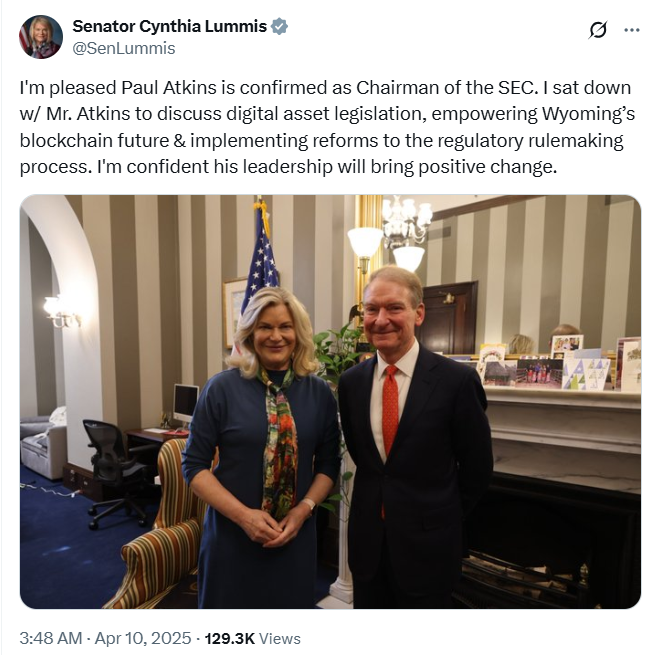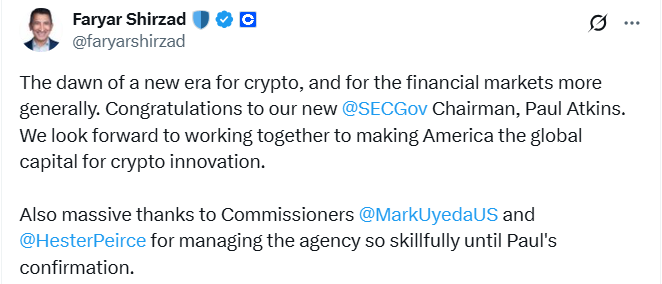来源: Cointelegraph原文: 《{title}》
加密行业对美国商人、前美国证券交易委员会(SEC)委员Paul Atkins被确认为该机构主席表示欢迎。
Atkins的任命经过了数月的时间。3月27日,他在参议院出席,详细阐述了自己在美国证券监管方面的预期做法以及他对数字资产的看法。
Atkins将接替代理主席Mark Uyeda,成为该机构的新任领导。自唐纳德·特朗普总统上任以来,SEC开始放松对加密货币公司的部分法院案件和执法行动,但这些行动尚未形成明确的指导方针。
如今,Atkins准备接过领导权,区块链行业希望能够获得多年来一直期待的明确指导。那么,Paul Atkins是谁?行业可以对他抱有何种期待?

参议员Cynthia Lummis庆祝这一确认。来源:Cynthia Lummis
Atkins毕业于Wofford College和Vanderbilt大学,在金融领域拥有丰富的工作经验。他最初在Davis Polk & Wardwell律师事务所工作,随后在1990年至1994年间担任过两位前任SEC主席的工作人员。
值得注意的是,在Richard Breeden担任主席期间,他协助努力减少中小企业进入资本市场的障碍。
在普华永道和Coopers and Lybrand工作之后,Atkins再次加入SEC,受前总统乔治·W·布什(George W. Bush)的任命担任委员。
在SEC期间,他专注于改善金融服务对SEC法规的合规性,并与执法机构合作处理投资者受到伤害的案件,其中包括一起由租赁公司实施的10亿美元庞氏骗局——Bennett Funding事件,导致2万名投资者蒙受重大损失。
离开委员职位后,他创立并领导了Potomak Global Partners,这是一家为银行和金融服务公司提供咨询服务的公司。
在52比44的确认投票(主要沿党派界限)之前,Atkins在参议院银行、住房和城市事务委员会面临严格的质询。在听证会上,Atkins表示,他担任主席期间的“首要任务”是通过“理性、连贯和原则性的方式”为数字资产提供坚实的监管基础。
他指出,当前对数字资产的“模糊和不存在的监管”损害了创新和行业发展。他更广泛地声称,全球企业希望在美国投资,但“我们金融系统的当前监管环境抑制了投资,往往惩罚了成功。”
国会议员Tom Emmer在谈到Atkins的提名时表示:“这将会很棒。”他指出,前主席Gary Gensler在前总统乔·拜登领导下“设定了一个相当低的标准。” Emmer表示,SEC有望提供行业期待已久的清晰度:“我们需要稳定币。我们需要市场结构。我们需要系统中的清晰性和确定性。”
Coinbase交易所的首席政策官Faryar Shirzad表示,这次确认是“新时代的曙光。”

来源:Faryar Shirzad
虽然没有人能预知未来,但Cointelegraph的最新分析显示,最近法院案件和执法行动的驳回可能揭示了SEC对加密监管的未来方向——或缺乏监管。
围绕“根据1933年证券法未经注册销售和提供证券以及作为未经注册的经纪商、交易商、清算机构和交易所的行为”的案件驳回,表明SEC可能不将所涉及的资产视为证券。
这一观点得到了SEC最近声明的支持,称工作量证明挖矿、联合挖矿和美元支持的稳定币不受证券法约束。总体而言,这表明SEC不认为加密货币受证券法约束。
Atkins升任SEC主席的一个摩擦点是最近SEC员工的大规模裁员。特朗普政府通过政府效率部(DOGE)的临时委员会来削减某些类型的政府开支的努力并未放过证券监管机构。
正如Politico在3月份报道的那样,不同的买断和裁员计划的结合将在未来几个月内有效裁掉该机构5000名员工中的10%。报告中提到的一个消息来源建议总数可能接近15%。
DOGE领导人埃隆·马斯克——他自己在职业生涯中多次与SEC发生冲突——据报道正在寻求进一步削减SEC已经削减的预算和员工。
一群被称为“影子SEC”的著名证券法教授对最近的裁员发出警告,称“削减SEC的员工将导致金融市场混乱,注册声明的审查时间更长,执法能力减弱。”
从头开始创建数字资产的新框架可能需要更长时间,尤其是在该机构人员和专业知识流失的情况下,而马斯克在华盛顿挥舞镰刀。
相关推荐:美国参议院通过表决,正式批准Paul Atkins在特朗普领导下出任美国证券交易委员会主席
免责声明:本文章仅代表作者个人观点,不代表本平台的立场和观点。本文章仅供信息分享,不构成对任何人的任何投资建议。用户与作者之间的任何争议,与本平台无关。如网页中刊载的文章或图片涉及侵权,请提供相关的权利证明和身份证明发送邮件到support@aicoin.com,本平台相关工作人员将会进行核查。




